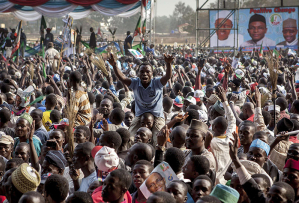
Boko Haram, an Islamist terror group in Africa, has made inroads in the country of Nigeria and is reported to be surrounding a city of two million people ahead of the Feb. 14 presidential elections there.
According to Jack Moore of Newsweek, eyewitnesses said that the group has surrounded the northeastern Nigerian city of Maiduguri; the militants made their move last week to coincide with U.S. Secretary of State John Kerry visit to the capital, Lagos. Although the Nigerian military has countered the attack, the development has triggered fears of a massacre in that big city.
"In terms of the encirclement of Maiduguri, we try to track the villages that Boko Haram occupies around Maiduguri and indeed it looks like a noose," former U.S. ambassador to Nigeria John Campbell said.
As editor of the Nigeria Security Tracker, Campbell added that Boko Haram's territorial gains in Borno State appear to show an encirclement of Maiduguri. According to Newsweek, 200,000 people have sought refuge in that city after militants carried out attacks in the surrounding area.
Given the size of the city, Campbell thinks that Boko Haram will try to capture and hold specific targets. He elaborated on their possible strategy to Newsweek.
"The airport of Maiduguri is important. It's both a civilian airport and a military base," Campbell said. "It's the international airport and the loss of this airport would be a severe blow to the federal government [based in Abuja]. Hence, I would not be surprised if the focus of a Boko Haram attack would be limited to the airport."
However, Campbell warned that another civilian massacre carried out by the extremist group is "certainly possible," particularly targeting those associated with the Nigerian government.
"The people I think would be the prime targets [of a Boko Haram offensive] would be officials, police, maybe teachers in secular schools, people like that," the former diplomat said.
Boko Haram has carried out its brutality not just on the government, but on civilians too. Emmanuel Ogebe of Breitbart talked with Henry (not his real name), a Christian boy who escaped from the group's control.
"Boko Haram has rarely shown mercy to Christian boys," Ogebe wrote, noting that Henry's story shared similarities with three other male survivors.
Ogebe reported that Henry must have received some sympathy from the murderous group, considering that they abducted him with an injured leg they initially thought was a war injury.
"Being a soldier meant immediate beheading," Ogebe wrote. "Christians usually were given a chance to convert before being killed. Not soldiers - Christian or Muslim."
Henry shared some chilling words from the militants to Ogebe about what Boko Haram does to girls. When he was under their control, the group abducted 276 Chibok schoolgirls; 20 of them managed to escape.
"We disturbed the world by abducting these girls," Henry said, recalling the militants' comments. "If we'd known, we would have been doing this before. One time we killed a bunch of schoolboys at Buni Yadi and let the girls go after warning them to leave school. We should have taken them then and we will from now on."
Henry also noted that Boko Haram gave him the option of marrying any of the captured girls. He told Ogebe that the terror group kept men and women apart in separate camps; some of the terrorists stayed apart from everyone in what was described as a sort of MOQ, or Married Officers Quarters.
"Once a woman comes there, there is no going back," Henry said.
Henry fled from Boko Haram's control nine months later after he found out that the terrorists razed his hometown, a "completely Christian hilltop enclave" where his family lived.
"He wondered what had happened to his aged mum," Ogebe wrote regarding Henry. "He must not let the terrorists know it was his hometown lest they finish him off, too."
Ogebe contended that the boy provided valuable information that could be treated as "actionable intelligence."
"The existence of MOQs in the terror camps might well mean that the girls, though married off, could still be in Sambisa Forest," Ogebe wrote. "The time to act is now. This is actionable intelligence."
According to Newsweek, Boko Haram is carrying out an insurgency in Nigeria's northeastern regions of Yobe, Adamawa and Borno; all of them have remained under a state of insurgency. Up to 10,404 people have been killed by the terror group since January 2014.






